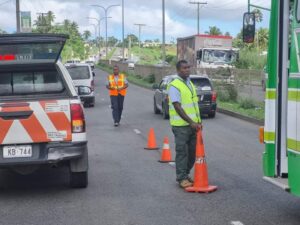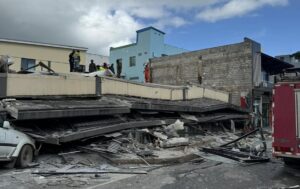Three people who received both doses of the vaccine are among 13 new COVID-19 fatalities in Fiji, which the Ministry of Health indicates could not be avoided and cannot be considered as fully vaccinated, adamant that vaccines remain the best defence against the virus.
The ministry said the effectiveness of the vaccines and the protection one can derive from it depend on a number of factors, including whether the vaccine was given on time and whether the two-week timeframe for the vaccine to take full effect has passed, both of which were not satisfied in the case of the three individuals based on their inoculation and infection timeframe.
The three comprising a 41-year-old man of Sigatoka, a 25-year-old woman of Lautoka and an 86-year-old woman from Tamavua all of whom died within 13 days of receiving the second dose and the first two’s demise compounded by their being infected before or shortly after receiving the second jab based on the onset of their symptoms.
“Two of these individuals were infected with the virus before they got the second dose of the vaccine. We must understand that there is a difference between cure and prevention. The vaccine is not a cure for COVID-19, which means it will not help if you get vaccinated when you are already infected and sick with the virus. The vaccine helps to prevent you from getting COVID-19 and dying from it,” Permanent Secretary for Health Dr James Fong said in a national address last night.
“Two doses of the vaccine help to lower your risk of getting infected with the virus and greatly reduces your risk of severe disease and death. The third patient got sick with COVID-19 and died within two weeks of the second dose. As we have made clear in numerous past statements, you must have two doses of the vaccine and wait at least two weeks after the second dose to be considered fully vaccinated. This is because your immune system needs at least two weeks to react to the vaccine and form a protective response. So, to be considered fully vaccinated, you need to receive both doses and wait two weeks after the second dose for the full protection to take effect.”
Thus the ministry reiterates the importance of people not only receiving both doses of the vaccine before they are infected but also making sure that it falls within the stipulated timeframe.
“So while we know that some people may still be infected even if they are fully vaccinated, these vaccines provide life-saving protection from severe COVID-19 and death. A fully vaccinated person may still get infected with the virus, however, they will likely experience only mild or no symptoms because of the protection provided by these vaccines. For instance, in the UK where they have a high vaccination coverage rate, they are now seeing surges of cases due to Delta variant, however, their daily hospitalisations and deaths have been less than previous COVID-19 outbreaks. For the US, we can see a similar picture where they are reporting significant spikes of COVID-19 cases and deaths in areas with high unvaccinated communities. Their hospitals and intensive care units are full of unvaccinated. These experiences from other countries and also the latest guidance from global experts provide us with a picture of what we can anticipate for the future here in Fiji. If we reach our goal of at least 80% vaccination of our target population, while we may still see individuals infected with the virus, we will not see nearly as many people becoming seriously ill, needing hospitalisation or dying from COVID-19.
“Our ultimate goal remains for us to protect our friends, family and colleagues from becoming seriously ill or dying from this virus. And vaccines are the best way to do that.”
DEATHS
Of the have 13 new COVID-19 deaths, six were registered in the central division and seven in the western division.
- 41-year-old man, Sigatoka
- He received the first dose of the vaccine in mid-April and the second on 29 July
- Presented to the Sigatoka Sub-divisional Hospital six days after, on 4 August in severe respiratory distress
- His family reported that he had a cough, fever and shortness of breath for six days prior to being seen at the hospital
- He was taken to the Lautoka Hospital the same day on 4 August, where he tested positive for COVID-19.
- He died on 8 August, four days after admission, and also within 10 days of his receiving the second dose.
- 86-year-old woman, Tamavua
- She received her first dose in late May and the second, on 26 July
- Presented to the CWM hospital in severe respiratory distress and tested positive for COVID-19 on 5 August (within 10 days of receiving the second dose)
- She died on 8 August, three days after admission, which also within 13 days of receiving the second dose.
- 25-year-old woman, Lautoka
- She received the first dose of the vaccine in early June and the second on 30 July
- Presented to the Lautoka Hospital on 6 August in severe respiratory distress. (within a week of receiving the dose and after one week after experiencing symptoms including coughing, sore throat and shortness of breath)
- She died on 8 August, two days after admission which was also within nine days of her receiving the second dose)
- 39-year-old man, Lami
- He was not vaccinated.
- Presented to the FEMAT field hospital in severe respiratory distress.
- He died on the same day of admission on 8 July
- 88-year-old woman, Lami
- Partially vaccinated having received the first dose in late July
- Died at home on 10 August.
- 88-year-old man, Ba.
- He was not vaccinated
- Presented to the Ba Mission Hospital in severe respiratory distress.
- He died on 10 August, one day after admission
- 86 year old woman from Ba
- She was not vaccinated
- Declared dead on arrival at the Ba Mission Hospital on 7 August
- 60-year-old woman, Ba
- She was not vaccinated
- Declared dead on arrival at the Ba Mission Hospital on 8 August.
- 82-year-old man, Sigatoka.
- He was not vaccinated
- Declared dead on arrival at the Sigatoka Sub-Divisional Hospital on 7 August
- 84-year-old man, Sigatoka.
- He was not vaccinated
- Declared dead on arrival at the Sigatoka Sub-Divisional Hospital on 8 August
- 56-year-old man, Nasinu
- He was unvaccinated
- Died at home on 10 August
- 57-year-old man, Nasinu
- He was not vaccinated
- Died at home on 10 August
- 77-year-old man, Nausori.
- He was not vaccinated
- Presented to the CWM hospital in severe respiratory distress.
- He died six days after admission.
There have been six other deaths involving COVID-19 positive patients. However, these deaths have been classified as non-COVID deaths having been “caused by serious pre-existing medical conditions.”
With the newly reported deaths, there have been 340 deaths due to COVID-19 in Fiji, with 338 of these deaths during the outbreak that started in April this year. The national 7-day rolling average of COVID-19 deaths per day is 7. The 7-day rolling average of COVID-19 deaths per day in the Central Division is five deaths and the Western Division is two deaths. Fiji has also recorded 177 COVID-19 positive patients who died from serious medical conditions thus not classified as COVID-19 deaths.
New COVID-19 Infections and Cumulative Total
Of the 568 new cases of COVID-19 for the 24 hour period that ended at 8 am yesterday, 11 August, 262 are from the western division and 306 cases from the central division.
There have been 664 new recoveries reported since the last update, which means that there are now 24,299 active cases. Of these, 18,566 active cases are in the central division and 5,733, in the western division.
There have been 38,344 cases during the outbreak that started in April 2021, and a cumulative total of 38,414 cases since the first case was reported in March 2020. There have been 13,598 recoveries since 2020.











